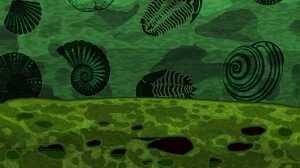The mystery of crude oil formation: The origin of Petroleum
As a Petroleum engineer, it's often cool sometimes to talk about what you know really best. Today, am going to bring your mind to some of the mystery of crude oil formation that has been a big challenge to the oil industry to understanding the actual theory behind the formation of crude oil.
Ever wondered what happens to the remains of plant and animals when they got buried? Ever wondered what happens to us when we died? What if there is no dead, does it mean that there wouldn't be crude oil formation? The mystery behind Petroleum formation remains unclear and still continues to be.
To decode the science of crude oil formation, we first need to go back in time.. Waay back. We have to set our geologic clocks back tens and even hundreds of millions of years to a time when ancient seas covered much of North America.
Small life forms, mostly algae and tiny creatures known as zooplankton lived in these ancient seas. They produce their life energy using CO2,water and sunlight. Like all living things, these plants and animals eventually died.. Their remains fell to the bottom and mixed with and were buried by sediments. Their remains and see floor sediment piled up for millions of years, and eventually the pressure from the piled sediment and heat caused changes in the plant and animals or organic materials into a wax like material called kerogen. Another by product of this pressure is a tar like substance known as bitumen. Kerogen is actually the building block of crude oil formation.

World's demand for crude oil is expected to rise up to 60% over the next two decades. It's important to take a new look at the origin of Petroleum to explore new Horizons and manage and predict hydrocarbon production in the existing oil and gas fields.
Despite the huge volume of data and visibly strong '' pros '' and '' cons'' of both theories of the generation of hydrocarbons and formation of oil and gas deposits are not the same processes though they are close in nature.
Research is being conducted to have a better understanding of the formation of hydrocarbon deposit and processes taking place in the rock system during the life of oil and gas fields.
'' Petroleum is a system of hydrocarbon (crude oil and natural gas), metals and other components kept together by a variety of chemical and physical forces.
Two theories of thoughts exists in regards to the origin of Petroleum: a western school suggests that it's origin is biogenic resulting from biological matter and stored in sedimentary basins while a Russian-ukranian school proposes that it is abiogenic with the deep origin in the Earth's crust. Which one can we then believe?
The first theory implies a finite source of Petroleum whereas the second suggests an almost unlimited one.
But there are some evidence for the organic origin of Petroleum which seems to be overwhelming:
1.Petroleum oil is mostly found in sedimentary rocks rather than igneous rocks such as granite and basalt.
2.Petroleum has ability to rotate the polarization of light which is typical for organic matter and is attributed to the presence of cholesterol.
3.Many crude oils contain porphyrins which may come either from chlorophyll in plants or from red cells in blood.
4.Most crude oil contain nitrogen which is an essential element in amino acids.
5.The chemical composition of the Petroleum is similar to the components of the organic material, although there is more carbon and hydrogen and less oxygen and nitrogen in the oil compared to the organic material.
Can we then said that Petroleum formation is of organic organic?
The question remains to be answered. Thus the cause of more confusion to the actual origin of crude oil formation.
Generation of hydrocarbon may take place in the Earth's depth while formation of oil and gas deposits is more complicated and involves microbiological activity, physical and chemical reactions associated with components of Reservoir rock, plate tectonics and other factors. Crude oils associated with different formations, age and location have similarities in the composition but differences as well.
Assumption can then be made that more than one mechanisms is responsible for formation of a particular Petroleum deposit. It also important to take into account that Petroleum deposits are not static and both Reservoir fluids and Reservoir rock change characteristics due to both natural factors and technology.
Both biogenic and abiogenic theories of the origin of Petroleum have their '' pros '' and '' cons '' and need to be taken into account and consideration.
The mystery of the origin of Petroleum remains unsolved and there is much more need to carrying out some field and laboratory research to understanding more to how Petroleum comes into existence.
We are still researching.. Me in particular, am into some great work to finding and going into the details the actual mystery behind the formation of Petroleum.
I remain messinaldo... Follow me @messinaldo
Upvote, comment and resteem please.
Imagine [email protected]
References:
1.Hunt, J. M., 1979. Petroleum geochemistry and geology. Freeman, San Francisco ISBN 0-7167-1005-6
2.Tissot B. P and Walte D. H. (1994) Petroleum formation and occurrence springer verlag, New York, 699p
3.www.intotheoutdoors.org
4.Hedberg, H. D., Geological aspects of origin of Petroleum, Amer. Assoc. Petrol. Geol. Bell, 48 (1964),1755-1803
Cheetah is on your post bro. That is not too good for you. Make sure you acknowledge your source next time
I will bro. Thanks. Am still new and learning the rules. I will do that next time
I found methane on planets, methane in deep sea and the whole abiogenic petroleum theories quite interesting.
Yes it's quite interesting and often times complicated to understand the mystery behind everything on Petroleum formation. Nice one